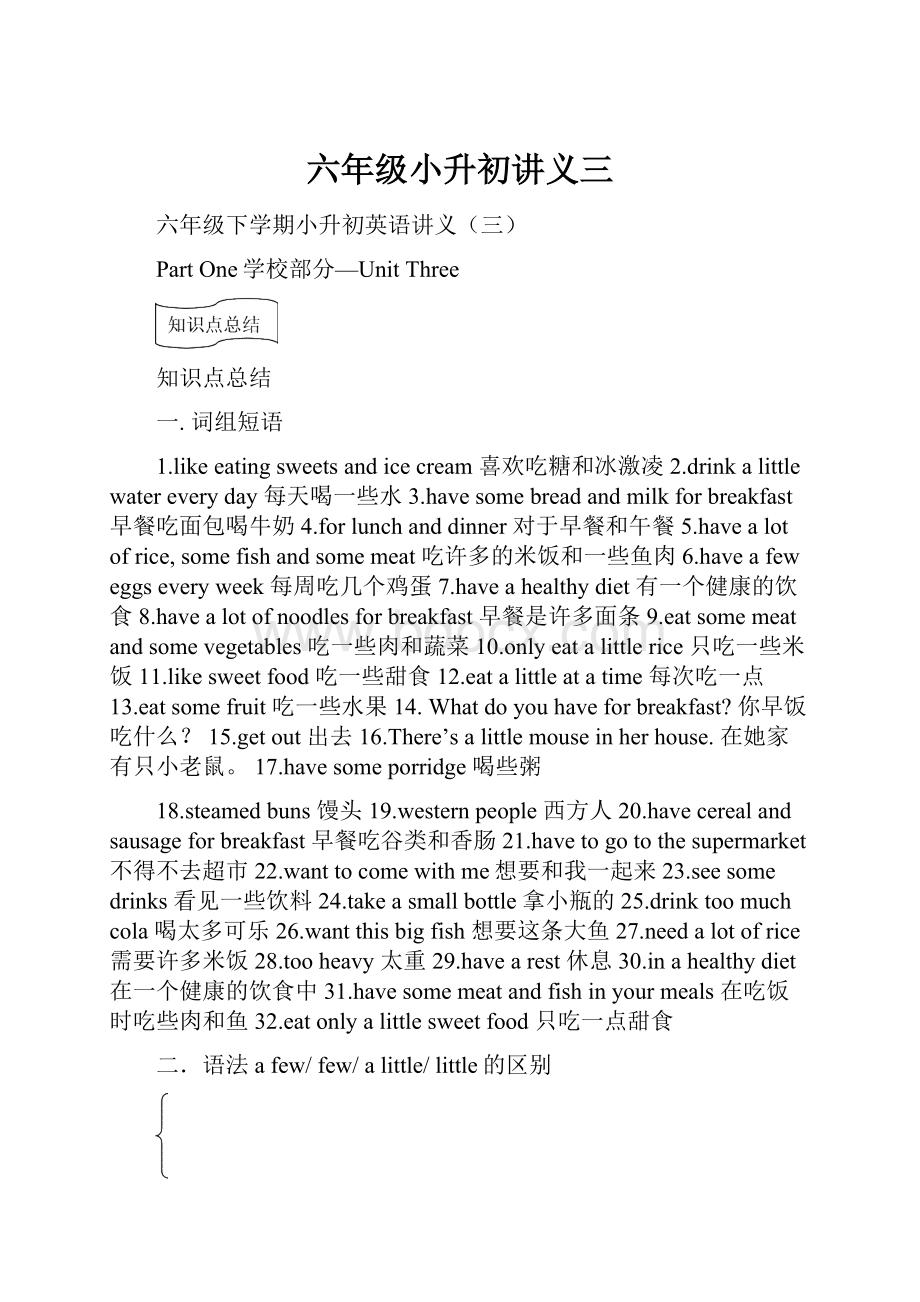六年级小升初讲义三.docx
《六年级小升初讲义三.docx》由会员分享,可在线阅读,更多相关《六年级小升初讲义三.docx(19页珍藏版)》请在冰豆网上搜索。

六年级小升初讲义三
六年级下学期小升初英语讲义(三)
PartOne学校部分—UnitThree
知识点总结
一.词组短语
1.likeeatingsweetsandicecream喜欢吃糖和冰激凌2.drinkalittlewatereveryday每天喝一些水3.havesomebreadandmilkforbreakfast早餐吃面包喝牛奶4.forlunchanddinner对于早餐和午餐5.havealotofrice,somefishandsomemeat吃许多的米饭和一些鱼肉6.haveafeweggseveryweek每周吃几个鸡蛋7.haveahealthydiet有一个健康的饮食8.havealotofnoodlesforbreakfast早餐是许多面条9.eatsomemeatandsomevegetables吃一些肉和蔬菜10.onlyeatalittlerice只吃一些米饭11.likesweetfood吃一些甜食12.eatalittleatatime每次吃一点13.eatsomefruit吃一些水果14.Whatdoyouhaveforbreakfast?
你早饭吃什么?
15.getout出去16.There’salittlemouseinherhouse.在她家有只小老鼠。
17.havesomeporridge喝些粥
18.steamedbuns馒头19.westernpeople西方人20.havecerealandsausageforbreakfast早餐吃谷类和香肠21.havetogotothesupermarket不得不去超市22.wanttocomewithme想要和我一起来23.seesomedrinks看见一些饮料24.takeasmallbottle拿小瓶的25.drinktoomuchcola喝太多可乐26.wantthisbigfish想要这条大鱼27.needalotofrice需要许多米饭28.tooheavy太重29.havearest休息30.inahealthydiet在一个健康的饮食中31.havesomemeatandfishinyourmeals在吃饭时吃些肉和鱼32.eatonlyalittlesweetfood只吃一点甜食
二.语法afew/few/alittle/little的区别
afew表示一些,含有肯定含义
可数名词
few表示几乎没有,含有否定含义
alittle表示一些,含有肯定含义
不可数名词
little表示几乎没有,含有否定含义
总结量词的使用:
1.alotof=中文意思是,后面加
2.much和many的中文意思是,much后面加
而many的后面加(somany,somuch,toomany,toomuch,muchtoo)
3.some的中文意思是,后面加
4.afew的意思是,后面加。
alittle意思是,后面加。
一、翻译下列词组。
1健康的饮食______________________2.takeasmallbottle______________________
3.许多食物______________________4.ashortmanbehindme_________________
5.喝太多可乐_________________6.eatalittleatatime_____________________
7.不得不回家_________________ 8.amapofthetown______________________
9.和我一起来__________________10.begoodforyourteeth__________________
二.按要求写单词
1.potato(复数)________________2.mango(复数)______________
3.afew(同义词组)_____________4.alotof(同义词)____________
5.health(形容词)______________6.tomato(复数)______________
7.tidy(反义词)_______________8.happy(副词)_______________
9.bite(过去式)______________10.put(三单)________________
三、选择正确的答案,将其序号填入括号内
1.Heshouldn’tdrinksocola,orhe’llbe
A.much;unhealthyB.alotof;healthyC.many;unhealthy
2.Myfatherhasdrinkseveryweek,butmymother
A.toomanyisn’tB.toomuchdoesn’tC.toomanydoesn’t
3.Wouldyoulikebread?
─Yes,please.
A.aB.anyC.anD.some
4.--Doeshereally____atschool?
--Sure.
A.goodatB.wellatC.begoodatD.dowell
5.Thereis____“o”inthe“word”.
A.anB.aC.theD./
6.Thefishis________heavy.
A.tooB.veryC.soD.A,BandC
7.______tothehospitalfaster,youcantakeataxi.
A.Get B.Toget C.Forget
8.--worksintheshop?
--Amy'sfather.
A.WhoB.WhoseC.Who's
9.______ahealthydiet,thereisalotoffruitandvegetables.
A.InB.ToC.On
10.Inahealthydiet,therealotof
A.is;vegetablesandfruit.B.are;vegetablesandfruit.C.are;fruitandvegetables
四、选词填空。
1.HeisaskingYangLinghow___________there.(get)
2.___________(notpick)theflowersinthepark.
3.Willyouplease___________(go)totheparkwithme?
4.Theystoppedthethiefand___________(take)himtothepolicestation.
5.Don’tmakenoise,Mymother___________(sleep)inthebedroom.
6.--______you(do)yourhomework,LiPing?
--Yes,Iam.
7.Howabout________(eat)somebread?
8CanIhave_______(some)cakes?
9.SuHai,________(keeps/keep)yourschoolbagclean!
10.There(benot)anymeatonmyplatejustnow.
五、按要求完成下列各句。
1.Amonkeywokethetigerup.(改成一般疑问句)
2.I’mgoingtoreadbooksintheroom.(对画线部分提问)
3.Igavehimasweet.(改成同义句)
4.Hehasafeweggseveryweek.(对划线部分提问)
5.Myfathereatsafewpears.(对划线部分提问)
6.Thebusstoppedbecausethelightisred.(画线提问)________________thebusstop?
7.Weshouldeatsomevegetableseveryday.(对划线部分提问)
8.SuYanghasahealthydiet.(改为一般疑问句)
六、根据中文意思,完成下列句子。
1.甜的食物很好吃,但是对你的牙齿不好。
Sweetfood_______nice,butitisnot____________your______.
2.--你妈妈有一个健康的饮食吗?
--是的。
--____yourmother_____a______diet?
--Yes,she____.
3.多吃点绿色食物,它能让我们保持健康。
Havegreen,itcan.
4.你不应当吃太多的橘子。
You_____eat_______________oranges.
5.你不能吃太多的糖!
Youeatsweets!
6.她只吃一点米饭。
She________________________rice.
7.冰箱里没有多少牛奶了。
Thereismilkinthe.
8.儿童每周应该吃几个鸡蛋。
Childrenshouldhave________________eggseveryweek.
9.你想要和我一起去吗?
---youliketogome.
10.你妈妈唱歌好吗?
好。
__________yourmother____________________?
Yes.
11.Sam在超市买了两大袋米
Sam_________twobig___________of_____________inthesupermarket.
12.他们在农场抓了很多鱼。
They_________lotsof________onthefarm.
13.我们每天只吃少量甜食。
We________eata__________________________everyday.
14.爷爷正在马路上和他的狗慢慢散步。
Grandpa___________________________ontheroad_________hisdog.
七.阅读理解。
A)阅读下列短文,根据短文意思判断,正确的写“T”,错误的写“F”。
Peopleeatdifferentthingsindifferentpartsoftheworld.InSouthChina,themainfoodisrice.People usually eat it with meat, fish and vegetables.They have rice every day.Sometimes they eat twice or three times for breakfast, lunch and supper.
The Japanese eat lots of fish. They like a raw fish very much.They think the raw fish is full of nutrition(营养).The Japanese also eat lots of rice.
In western countries, such as Britain,Australia and the USA, the most important food is bread and potatoes. They like fried fish and chips very much. Some people eat only fruit and vegetables.They say that food from plants is better for usthanmeet.
()1.People eat the same food in different countries.
()2.In south China the main food is meat.
()3.The Japanese eat lots of fish and rice.
()4.All the people say that food from plants is better than meet.
()5.In Australia the most important food is rice.
B)选择填空。
Once upon a time,there were three boys,Tom Jack,and Eric.They were brothers.One day they went into a restaurant and ordered some hamburgers.When they were waiting for the hamburgers,they remembered that they didn't bring any money.“Hey, we forgot to bring money to pay for our hamburgers,”Tom said.“Eric can go home and get it,”Jack said, “because he is the youngest.He should be the one to go.”Eric wasn't very pleased at this, so he said, “All right, I'll go, but you must promise not to eat my hamburger while I'm away.”Tom and Jack agreed,so the little boy set off for home,and got some money.A few minutes later,Jack said to Tom,“Let's eat Eric's hamburger, OK?
”“OK.”They reached for the hamburger.As they did so, Eric shouted from the door of the restaurant,“If you touch my hamburger and I won’t go and get the money.”
()1Who is the youngest boy?
ATomBJackCEric
()2.The story happened_________.
AinaparkBinarestaurantCatschool
()3.They set Ericto go home because__________
AEricistheyoungestBEriccanrunfast
CEricisverystrong
()4.Which sentence is NOT true?
AEricwantedtogohome.
BTheyorderedsomehamburgersintherestaurant.
CJackandTomwantedtoeatEric’shamburger.
()5.DidEricgohomeatlast?
AYes.BNo.CIdon’tknow.
PartTwo小升初部分
专题三:
形容词&副词
形容词是用来修饰名词的,表示名词的属性和特点的。
形容词在表示“比较……”和“最……”这样的概念时,要用特别的形式:
形容词的比较级和最高级。
形容词和副词的比较级和最高级的变化规律
1.一般单音节词和少数以-er,-ow结尾的双音节词,比较级在后面加-er,最高级在后面加-est如:
small→smaller→smallest双音节词如:
clever→cleverer→cleverestnarrow→narrower→narrowest
2.以不发音e结尾的单音节词,比较在原级后加-r,最高级在原级后加-st;如:
large→larger→largest
3.在重读闭音节(即:
辅音+元音+辅音)中,先双写末尾的辅音字母,比较级加-er,最高级加-est;如:
big→bigger→biggesthot→hotter→hottestfat→fatter→fattest
4.以“辅音字母+y”结尾的双音节词,把y改为i,比较级加-er,最高级加-est;如:
easy→easier→easiest
5.其他双音节词和多音节词,比较级在前面加more,最高级在前面加most;如:
beautiful→morebeautiful→mostbeautifuldifferent→moredifferentdifferent→mostdifferenteasily→moreeasily→mosteasily
注意:
(1)形容词最高级前通常必须用定冠词the,副词最高级前可不用。
例句:
TheSaharaisthebiggestdesertintheworld.
7.有少数形容词、副词的比较级和最高级是不规则的,必须熟记。
如:
good→better→bestwell→better→bestbad→worse→worstill→worse→worstold→older/elder→oldest/eldestmany/much→more→mostlittle→less→leastfar→further/farther→furthest/farthest
二.副词
副词是用来修饰动词、形容词和副词,说明时间、地点、方式、程度等概念。
形容词和副词之间转换规律:
形容词变为副词的方法:
一般在形容词的词尾加-ly可以变成副词。
例如:
quick—quickly,slow—slowly,loud—loudly,sudden—suddenly等。
但是,以下几点值得注意:
1.一些以“辅音字母+y”结尾的形容词,要把y改为i再加-ly。
例如:
happy—happily,angry—angrily,lucky—luckily,heavy—heavily,noisy—noisily等。
2.有些以-ble或-le结尾的形容词,去掉e加-y。
例如:
possible—possibly,terrible—terribly等。
3.少数以e结尾的形容词,要去掉e再加-ly。
例如:
true—truly等。
但绝大多数以e结尾的形容词仍然直接加-ly。
例如:
polite—politely,wide—widely等。
4.以-l结尾的形容词变为副词时仍然要在词尾加-ly,而不是只加-y。
除非是以-ll结尾的才在词尾只加-y。
例如:
usual—usually,careful—carefully,useful—usefully,full—fully等。
一.选择
()1.IamonlyfifteenbutI’m1.70m.
A.tallB.longC.short
()2.Whocanstudyinyourclass?
A.wellB.betterC.best
()3.LiuTaoisofthetwo.
A.theclevererB.cleverC.cleverest
()4.Mydeskisthanmybrother’s.
A.manybiggerB.muchbiggerC.morebigger
()5.Hejumpsinourclass.
A.highlyB.highC.higher
()6.---It’ssocoldtoday.---Yes,it’sthanitwasyesterday.
A.morecold B.morecolder C.muchcolder D.cold
()7.Peterwritesofthethree.
A.better B.best C.good D.well
()8.Theboxisheavyforthegirlcarry.
A.too;to B.to;too C.so;that D.no;to
()9.Jonelooksso_______todaybecauseshehasgotan“A”inhermathstest.
A.happyB.happilyC.angryD.angrily
()10.IfyouwanttolearnEnglishwell,youmustuseitas_______aspossible.
A.oftenB.longC.hardD.soon
二.根据首字母或适当形式填空.
1.Themeattastesd.Ilikeit.
2.Hedoesn’tdohishomework.Histeacherisa